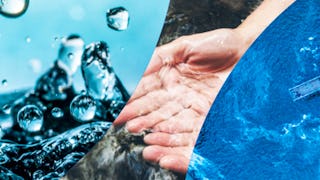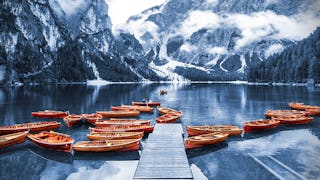In recent decades, international law has undergone a series of major developments in order to accommodate the many new facets of freshwater management and protection. The adoption of universal, regional and basin instruments highlights how important it is to study the evolution of international water regulations and to be able to identify the main principles in this field. This course aims to provide the necessary background to understand and examine the regulation applicable to transboundary freshwaters especially to rivers, lakes and aquifers. It presents the principles and legal standards that govern the use, sharing, management and protection of these resources.



International Water Law



Instructeurs : Laurence Boisson de Chazournes
25 046 déjà inscrits
Inclus avec 
(451 avis)
Détails à connaître

Ajouter à votre profil LinkedIn
7 devoirs
Découvrez comment les employés des entreprises prestigieuses maîtrisent des compétences recherchées


Obtenez un certificat professionnel
Ajoutez cette qualification à votre profil LinkedIn ou à votre CV
Partagez-le sur les réseaux sociaux et dans votre évaluation de performance

Il y a 5 modules dans ce cours
With around two hundred and seventy-six (276) rivers and lakes and a large number of groundwater shared by two or more States, there is an increasing level of interest in the importance of international law in this area. This introductory module is designed to highlight how international regulation is fundamental to achieving a harmonious and peaceful management of these essential resources. It outlines the various issues and challenges related to the management and protection of water resources. Whilst emphasis is placed on the factors that can lead to conflict, the module will also show how water can be considered as an instrument of peace and cooperation among States. Within this context, the benefits of cooperation between States over transboundary freshwater are examined. We will also analyse the different uses linked to water resources and the relationships that exist between them. The module will be concluded by a quiz worth 15% of the final mark. You must have at least 80% of the answers correct to pass the module.
Inclus
10 vidéos2 lectures2 devoirs1 sujet de discussion
This module outlines the major milestones in the evolution of international freshwater regulation. It will present the scope and contribution of the United Nations Convention on the Law of the Non-Navigational Uses of International Watercourses (1997 Convention) and the Convention on the Protection and Use of Transboundary Water and International Lakes of the United Nations Economic Commission for Europe (UNECE) (1992 Convention). The role of international organizations, international academic societies and civil society in the development and promotion of these instruments will be highlighted. The unique nature of groundwater regulation is also addressed and we will look closely at the main features of the 2008 International Law Commission’s Draft articles on the Law of Transboundary Aquifers. We will also examine the best practice shown in the 2008 Convention on the Protection, Utilisation, Recharge and Monitoring of the Franco-Swiss Genevois Aquifer. The module will be concluded by a quiz worth 20% of the final mark. You must have at least 80% of the answers correct to pass the module.
Inclus
10 vidéos2 devoirs1 sujet de discussion
This module presents the general principles governing how water is shared and we will also examine the rules associated with planned measures on transboundary waters. We will take a look at the theory behind the principle of equitable and reasonable use, the obligation to not cause significant harm and the principle of cooperation. The rules of notification, consultation and negotiation in the case of planned measures will be examined in detail. We will also focus how these principles interact with each other. The module will be concluded by a quiz worth 25% of the final mark. You must have at least 80% of the answers correct to pass the module.
Inclus
9 vidéos1 devoir1 sujet de discussion
This module highlights how other bodies of norms such as international environmental law, human rights and the law of climate change have contributed to the protection of transboundary freshwaters. The module presents the main international conventions that deal with the environment and details the principles that apply to the management of shared water resources (such as prevention, precaution and the obligation to conduct an environmental impact study). We will examine new legal instruments that take into account these aspects of international freshwater law via the water charters (such as for the Senegal River, the Niger River Basin, the Lake Chad Basin). The module will be concluded by a quiz worth 25% of the final mark. You must have at least 80% of the answers correct to pass the module.
Inclus
8 vidéos1 devoir1 sujet de discussion
This module presents the diplomatic and judicial mechanisms that exist for resolving water-related disputes. The essential role of basin organizations and commissions in the prevention and resolution of conflicts over water is also addressed. Finally, we examine the details of the decisions of international tribunals and courts about shared water resources and we assess their contribution to the development of international freshwater law. The module will be concluded by a quiz worth 20% of the final mark. You must have at least 80% of the answers correct to pass the module.
Inclus
7 vidéos1 devoir1 sujet de discussion
Instructeurs


Offert par
En savoir plus sur Law

University of Geneva

PepsiCo

University of Geneva
Pour quelles raisons les étudiants sur Coursera nous choisissent-ils pour leur carrière ?




Avis des étudiants
451 avis
- 5 stars
76,49 %
- 4 stars
16,40 %
- 3 stars
3,10 %
- 2 stars
1,33 %
- 1 star
2,66 %
Affichage de 3 sur 451
Révisé le 3 juil. 2020
This coarse will give you a basic overview of Laws and mechanisms to resolve trans-boundary water disputes. Knowledge regarding issues and case studies related to ground water and fresh water.
Révisé le 3 juin 2020
Interesting Course proving a basic knowledge of International Waters and the laws that govern them. The case studies are very interesting to understand the treaties and laws.
Révisé le 15 juin 2022
Exercises were really challenging!I had to go through the course by reading subtitles alone. But the teachers were cheerful and made it easier. <3

Ouvrez de nouvelles portes avec Coursera Plus
Accès illimité à 10,000+ cours de niveau international, projets pratiques et programmes de certification prêts à l'emploi - tous inclus dans votre abonnement.
Faites progresser votre carrière avec un diplôme en ligne
Obtenez un diplôme auprès d’universités de renommée mondiale - 100 % en ligne
Rejoignez plus de 3 400 entreprises mondiales qui ont choisi Coursera pour les affaires
Améliorez les compétences de vos employés pour exceller dans l’économie numérique
Foire Aux Questions
Access to lectures and assignments depends on your type of enrollment. If you take a course in audit mode, you will be able to see most course materials for free. To access graded assignments and to earn a Certificate, you will need to purchase the Certificate experience, during or after your audit. If you don't see the audit option:
The course may not offer an audit option. You can try a Free Trial instead, or apply for Financial Aid.
The course may offer 'Full Course, No Certificate' instead. This option lets you see all course materials, submit required assessments, and get a final grade. This also means that you will not be able to purchase a Certificate experience.
When you purchase a Certificate you get access to all course materials, including graded assignments. Upon completing the course, your electronic Certificate will be added to your Accomplishments page - from there, you can print your Certificate or add it to your LinkedIn profile. If you only want to read and view the course content, you can audit the course for free.
You will be eligible for a full refund until two weeks after your payment date, or (for courses that have just launched) until two weeks after the first session of the course begins, whichever is later. You cannot receive a refund once you’ve earned a Course Certificate, even if you complete the course within the two-week refund period. See our full refund policy.
Plus de questions
Aide financière disponible,



